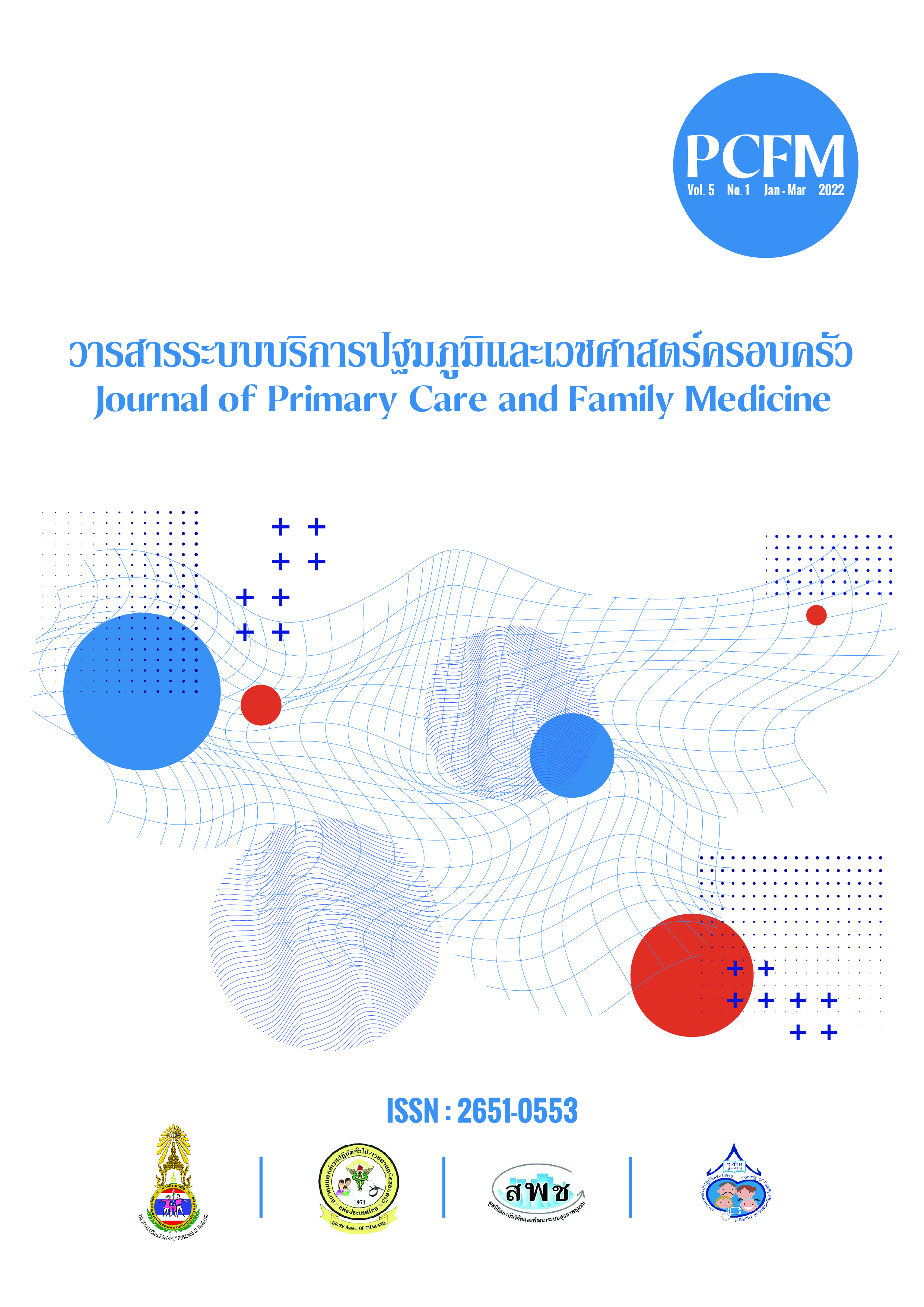ความร่วมมือในการใช้ยาในผู้สูงอายุที่เป็นเบาหวานและมีโรคเรื้อรังร่วมหลายโรคและปัจจัยที่เกี่ยวข้อง ณ โรงพยาบาลสารภี จังหวัดเชียงใหม่
Main Article Content
บทคัดย่อ
ที่มาและวัตถุประสงค์: ผู้ป่วยสูงอายุที่เป็นเบาหวานและมีโรคเรื้อรังร่วมหลายโรคมีเพิ่มมากขึ้นแต่พบความร่วมมือในการใช้ยาที่ลดลง งานวิจัยนี้จัดทำเพื่อศึกษาความชุกและปัจจัยที่สัมพันธ์กับความร่วมมือการใช้ยาของผู้ป่วยกลุ่มดังกล่าว
แบบวิจัย: การศึกษาเชิงสังเกตการณ์ชนิดภาคตัดขวาง
วัสดุและวิธีการ: ใช้แบบบันทึกข้อมูลทั่วไปและแบบสอบถามความร่วมมือการใช้ยาในผู้ป่วยสูงอายุที่เป็นเบาหวานและมีโรคเรื้อรังร่วมหลายโรค ในคลินิกเบาหวาน โรงพยาบาลสารภี จังหวัดเชียงใหม่ จำนวน 145 คน วิเคราะห์แจกแจงข้อมูลโดยความถี่, ร้อยละ, ไคสแควร์, t-test และวิเคราะห์สหสัมพันธ์ถดถอย
ผลการศึกษา: พบความชุกความร่วมมือในการใช้ยาสูง ร้อยละ 68.3 ระดับน้ำตาลอดอาหาร เฉลี่ย 155.4 มก./ดล. น้ำตาลสะสม เฉลี่ย 8.4 มก./ดล. มีภาวะแทรกซ้อนจากเบาหวานร้อยละ 60.8 มีโรคร่วม 3 โรคขึ้นไปร้อยละ 88.9 จำนวนยาเฉลี่ย 5.8 ชนิดต่อวัน ปัจจัยที่สัมพันธ์กับความร่วมมือการใช้ยาสูงได้แก่ สถานภาพไม่มีคู่สมรส (aOR 2.42, p=0.05) ความไม่กังวลต่อผลข้างเคียงจากการใช้ยา (aOR 2.84, p=0.02) และการมีสมาชิกในครอบครัวดูแลการรับประทานยา (aOR 4.27, p=0.03)
สรุป: จากผลปัจจัยที่สัมพันธ์ความร่วมมือในการใช้ยาสูง ทีมดูแลควรประเมินความกังวลและให้ความรู้ความเข้าใจที่ถูกต้องเกี่ยวกับยา และสนับสนุนครอบครัวดูแลเรื่องการรับประทานยา เพื่อให้เกิดความร่วมมือในการใช้ยาที่ดี ลดภาวะแทรกซ้อนในอนาคต
Article Details

อนุญาตภายใต้เงื่อนไข Creative Commons Attribution-NonCommercial-NoDerivatives 4.0 International License.
เนื้อหาและข้อมูลในบทความที่ลงตีพิมพ์ในวารสาร PCFM ถือเป็นข้อคิดเห็นและความรับผิดชอบของผู้เขียนบทความโดยตรง ซึ่งกองบรรณาธิการวารสารไม่จำเป็นต้องเห็นด้วยหรือร่วมรับผิดชอบใด ๆ
บทความ ข้อมูล เนื้อหา รูปภาพ ฯลฯ ที่ได้รับการตีพิมพ์ลงในวารสาร PCFM ถือเป็นลิขสิทธิ์ของวารสาร PCFM หากบุคคลหรือหน่วยงานใดต้องการนำทั้งหมดหรือส่วนหนึ่งส่วนใดไปเผยแพร่ต่อหรือเพื่อกระทำการใด ๆ จะต้องได้รับอนุญาตเป็นลายลักษณ์อักษรจากวารสาร PCFM ก่อนเท่านั้น
เอกสารอ้างอิง
Nunes BP, Flores TR, Mielke GI, Thumé E, Facchini LA. Multimorbidity and mortality in older adults: A systematic review and meta-analysis. Arch Gerontol Geriatr. 2016;67:130-8.
Willadsen TG, Siersma V, Nicolaisdóttir DR, Køster-Rasmussen R, Jarbøl DE, Reventlow S, et al. Multimorbidity and mortality: A 15-year longitudinal registry-based nationwide Danish population study. J Comorb. 2018;8:2235042x18804063.
Di Angelantonio E, Kaptoge S, Wormser D, Willeit P, Butterworth AS, Bansal N, et al. Association of Cardiometabolic Multimorbidity With Mortality. Jama. 2015;314:52-60.
de Souza ASS, Braga JU. Trends in the use of health services and their relationship with multimorbidity in Brazil, 1998–2013. BMC Health Services Research. 2020;20:1080.
Ho PM, Bryson CL, Rumsfeld JS. Medication adherence: its importance in cardiovascular outcomes. Circulation. 2009;119:3028-35.
Payne RA. The epidemiology of polypharmacy. Clin Med (Lond). 2016;16:465-9.
Lee VW, Pang KK, Hui KC, Kwok JC, Leung SL, Yu DS, et al. Medication adherence: is it a hidden drug-related problem in hidden elderly? Geriatr Gerontol Int. 2013;13:978-85.
Mansur N, Weiss A, Hoffman A, Gruenewald T, Beloosesky Y. Continuity and adherence to long-term drug treatment by geriatric patients after hospital discharge: a prospective cohort study. Drugs Aging. 2008;25:861-70.
González-Bueno J, Sevilla-Sánchez D, Puigoriol-Juvanteny E, Molist-Brunet N, Codina-Jané C, Espaulella-Panicot J. Factors Associated with Medication Non-Adherence among Patients with Multimorbidity and Polypharmacy Admitted to an Intermediate Care Center. International Journal of Environmental Research and Public Health. 2021;18:9606.
Smaje A, Weston-Clark M, Raj R, Orlu M, Davis D, Rawle M. Factors associated with medication adherence in older patients: A systematic review. Aging Med (Milton). 2018;1:254-66.
Kim S, Bennett K, Wallace E, Fahey T, Cahir C. Measuring medication adherence in older community-dwelling patients with multimorbidity. European Journal of Clinical Pharmacology. 2018;74:357-64.
Vatcharavongvan P, Puttawanchai V. Polypharmacy, medication adherence and medication management at home in elderly patients with multiple non-communicable diseases in Thai primary care. Family Medicine and Primary Care Review. 2017;19:412-6.
Cooper C, Carpenter I, Katona C, Schroll M, Wagner C, Fialova D, et al. The AdHOC Study of older adults' adherence to medication in 11 countries. Am J Geriatr Psychiatry. 2005;13:1067-76.
Reddy A, Huseman TL, Canamucio A, Marcus SC, Asch DA, Volpp K, et al. Patient and Partner Feedback Reports to Improve Statin Medication Adherence: A Randomized Control Trial. J Gen Intern Med. 2017;32:256-61.
Náfrádi L, Nakamoto K, Schulz PJ. Is patient empowerment the key to promote adherence? A systematic review of the relationship between self-efficacy, health locus of control and medication adherence. PLoS One. 2017;12:e0186458.
Jiraporncharoen W, Pinyopornpanish K, Junjom K, Dejkriengkraikul N, Wisetborisut A, Papachristou I, et al. Exploring perceptions, attitudes and beliefs of Thai patients with type 2 diabetes mellitus as they relate to medication adherence at an out-patient primary care clinic in Chiang Mai, Thailand. BMC Family Practice. 2020;21:173.


